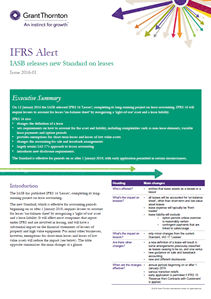-
Corporate Finance and Deal Advisory
We offer a dedicated team of experienced individuals with a focus on successfully executing transactions for corporates and financial institutions. We offer an integrated approach, with our corporate finance specialists working seamlessly with tax and other specialists to ensure that every angle is covered.
-
Digital Risk
Grant Thornton offers solutions to the digital risk issues you are sure to face. Our skilled and experienced security team can helping by advising and consulting, giving you peace of mind, clear value for money and an enhanced ability to react to attacks.
-
Technology Consulting
Motivating and assisting our clients to pursue, maintain and secure the benefits of digital solutions is at the core of our Digital Transformation teams' agenda and goals. We work with business leaders to deliver efficient digital strategies and operating models that provide new or enhanced capabilities.
-
Economic Advisory
Our all-island Economics Advisory team combines expertise in economics and business with a wealth of experience across the public and private sectors.
-
Forensic Accounting
We have a different way of doing business by delivering real insight through a combination of technical rigour, commercial experience and intuitive judgment. We take pride in delivering responsive and tailored solutions to all our clients, capitalising on the wealth of experience housed within our Belfast and wider Forensics team
-
People and Change Consulting
The Grant Thornton People & Change Consulting practice works with clients on these issues as well as on all aspects of how they attract, retain, engage develop, deploy and lead their people.
-
Restructuring
We work with a wide variety of clients and stakeholders such as high street banks, private equity funds, directors, government agencies and creditors to implement solutions which provide the best possible outcomes.
-
Corporate and International Tax
Northern Ireland businesses face further challenges as they operate in the only part of the UK that has a land border with a country offering a lower tax rate.
-
Employer Solutions
Our team specialises in remuneration and incentive planning and works closely with employers, shareholders and employees to ensure that business strategies are aligned and goals achieved in the most tax efficient, cost-effective manner.
-
Entrepreneur and Private Client Taxes
Our team of experienced advisors are on hand to guide you through any decision or transaction ranging from the establishment of new business ventures, to realising value on exit, to succession planning and providing for loved ones.
-
Global Mobility Services
Grant Thornton Ireland offer a different approach to managing global mobility. We have brought together specialists from our tax, global payroll, people and change and financial accounting teams across Ireland and Northern Ireland, while drawing on the knowledge and insights of our global network of over 143 offices of mobility professionals to provide you with a holistic approach to managing global mobility.
-
Outsourced Payroll
Our outsourced service provides valued service to over 150 separate PAYE schemes. These ranging from 1 to 1000 employees, working for micro, SME and global employers. The service is supported by the integrated network of tax and global mobility teams and the wider Grant Thornton network delivering a seamless service. Experienced staff deliver a personal service built around your business needs.
-
Tax Disputes and Investigations
Our Tax Disputes and Investigation team is made up of tax experts and former HMRC investigators who have years of experience in dealing with a variety of tax investigations. Our expertise and insight can guide you through all interactions, keeping your cost at a minimum while allowing you to continue with the day to day running of your business.
-
VAT and Indirect Taxes
At Grant Thornton (NI) LLP, our team helps Northern Ireland businesses manage their UK and global indirect tax risks which, as transactional taxes, can quickly become big liabilities.
On 13 January 2016 the IASB released IFRS 16 'Leases', completing its long-running project on lease accounting. IFRS 16 will require lessees to account for leases 'on-balance sheet' by recognising a 'right-of-use' asset and a lease liability.
IFRS 16 also:
- changes the definition of a lease;
- sets requirements on how to account for the asset and liability, including complexities such as non-lease elements, variable lease payments and option periods;
- provides exemptions for short-term leases and leases of low value assets;
- changes the accounting for sale and leaseback arrangements;
- largely retains IAS17's approach to lessor accounting; and
- introduces new disclosure requirements.
The Standard is effective for periods on or after 1 January 2019, with early application permitted in certain circumstances.
Bringing all leases on-balance sheet is controversial. The IASB has therefore made compromises to reduce the controversy, in particular exemptions for short-term and low value asset leases. As a result businesses that lease only assets such as printers and laptops will face only a limited impact. For businesses that lease 'big-ticket' assets, such as property and high-value equipment, this will however be a major change. Whatever your views on the new Standard, businesses would be well-advised to start an impact analysis sooner rather than later.


